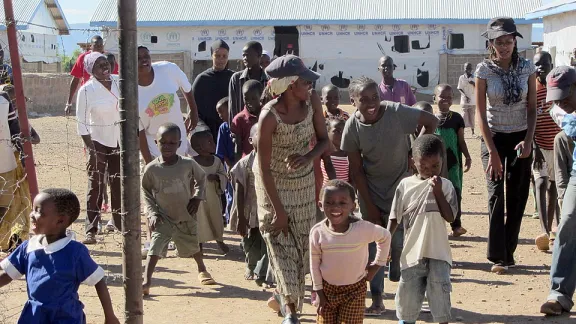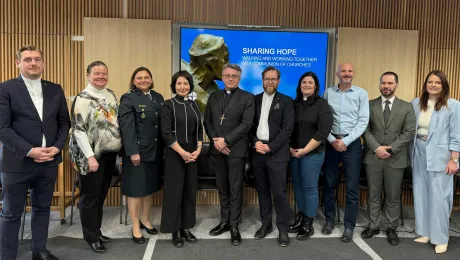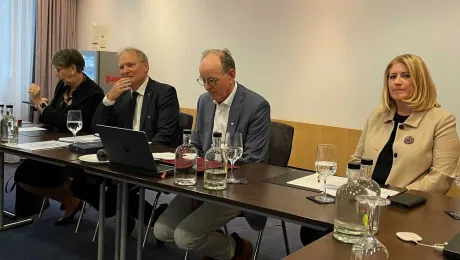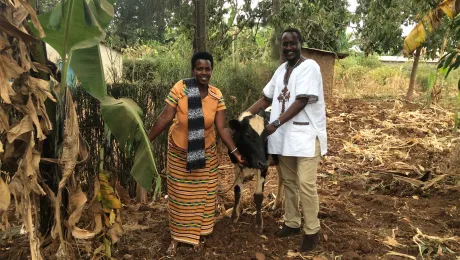
Playful singing and dancing at the Kakuma reception center © LWF/DWS/R. Karimi
Overcrowding at Kakuma Camp as Southern Sudanese Seek Safety
Violence along the border between Sudan and South Sudan over territorial control and resources, and clashes between communities during cattle raids in the newly independent South are bringing back hundreds of families to a refugee camp in neighboring Kenya, where they lived several years ago.
The growing numbers are putting pressure on already strained services at the Kakuma refugee camp in northwestern Kenya, according to humanitarian organizations providing services there, including The Lutheran World Federation (LWF).
Established in 1992 to accommodate 90,000 refugees, it had 96,000 people by 22 May, and the numbers are expected to reach 100,000 by the end of June. The new arrivals are mainly from South Sudan, with more than 1,000 registered per month since February, according to the United Nations High Commissioner for Refugees (UNHCR) statistics. The relatively high influx from Sudan brings the total number registered from both countries to 34,000 refugees, second only to Somalis who comprise 47,000 people.
The LWF is in discussions with the local authorities and UNHCR about taking part in the establishment of a new camp that is planned to accommodate the increasing numbers.
Seeking Refuge Again
Nob Jakot, 19, is back at the reception center where he was registered for the first time in 2000, then slightly older than six years accompanied by older relatives, and they lived in Kakuma camp until 2002, when they opted to go back home to in search of better opportunities.
Tension over local election results in South Kordofan state, Sudan’s oil-producing region, prompted recent protests that were followed by military attacks on civilians. “[They] raided and shot our people, bombed our homes and farms,” recalls Jakot, who was in primary school in Umsardiba village, which is inhabited by many communities who support South Sudan.
His family members— mother, father and seven other siblings—were at first scattered as they fled for their lives but they reunited later and eventually found their way to a congested camp for internally displaced persons (IDPs) in South Sudan’s capital Juba. Jakot and his brothers proceeded to Kakuma camp.
Namach Chuol Malual, 26, from Jonglei State in South Sudan, escaped to Kakuma with her three children, two brothers, one sister and a nephew after cattle raiders attacked their village, Akobo, near the southeastern border with Ethiopia.
“We all ran in different directions, including my mother and the other siblings,” she said. But her father and husband were not so lucky: “The attackers shot them dead,” she adds. Her eldest brother has been missing since.
At Akobo trading center, government officials told them that there was no food or shelter available, but military vehicles transported them to a UNHCR transit camp in Jonglei, and then to the IDP camp in Juba. “I decided to join a group of asylum seekers who were organizing public transport to come to Kakuma,” she says.
Others like 32-year-old Rina Mulangari “have not been to Kakuma before and know no one here.” Before the escalation of military attacks on Kualip village in South Kordofan, “I used to farm the fields for my family’s food, and my husband was self-employed,” says the mother of two young children, one born in a nearby village where she and others fleeing villagers had sought refuge. “The military airplanes’ bombing during the daytime was bad for my unborn baby, I would have lost the baby,” she recalls.
Psychological Support
The LWF runs the reception center at Kakuma camp, where new arrivals are registered and provided with basic needs such as food, clothing, shelter and household goods. Female-headed households, unaccompanied minors, one to two-person families and child-headed households are considered to be the most traumatized and thus needing more time to settle down.
Families such as Mulangari’s can stay up to two weeks at the center, which will allow child protection and gender units to conduct a special category assessment, including tracing any residents from her community or distant relatives or neighbors who would be willing to offer the family social support.
Malual, whose family arrived in Kakuma on 20 April, says the reception services were good. “At least I can rest and the children are getting used to the changed climate and surroundings. The people here are welcoming, warm and friendly,” she adds.
Many of the refugees have survived traumatic experiences and require psychological support, says Okello Arweny, the LWF area coordinator for Kakuma.
“Support by professional social workers will make it easy for the majority of refugees to quickly settle down in the camp with fewer incidences of violence, community conflict and delinquency,” he explained. The center can accommodate up to 600 people a day
Services Are Run Down
Through its Department for World Service (DWS) country program in Kenya-Djibouti, the LWF manages some of the services to refugees at Kakuma camp, which for more than two decades was home to mainly Southern Sudanese fleeing the conflict at home. With peace agreements and independence in July 2011, tens of thousands repatriated to South Sudan, where the LWF also supports returnees.
DWS Director Rev. Rev. Eberhard Hitzler, recently visiting the Kakuma camp, expressed deep concern about the upsurge of violence between the neighboring countries. “Last year, we were hoping that after the Comprehensive Peace Agreement [2005] and the creation of the newest nation of South Sudan, Kakuma would soon be empty and that Southern Sudanese refugees would be able to go home,” he noted.
The camp is now run down and needing funds to rebuild, says Hitzler. “I was deeply embarrassed when we visited a school building in which the LWF provides educational services. There were classrooms without books, old desks and chairs for half a dozen students while the classroom fills up with hundreds of students.”
“It is a miracle that teachers and students can still perform under such circumstances. But it is a shame that neither UNHCR nor LWF is able to find funds to improve these conditions,” adds the head of the LWF humanitarian arm, which provides services to refugees and other marginalized people in more than 30 countries in Africa, Asia and the Middle East, and Latin America and the Caribbean.
Sign of Hope
Some additional help arrived recently at Kakuma’s reception center. Through an appeal of the global emergency network ACT Alliance, of which the LWF is a founding member, USD 58,000 was donated to expand the kitchen facilities, pay additional staff and install water tanks and children’s play equipment.
Despite the difficult situation at Kakuma, Hitzler says he is heartened by the fact that students from 13 nations are learning to live peacefully together and to understand each other in the camp.
“It is for me a sign of hope for peace and reconciliation in Africa. […] I pray that the people who now live in Kakuma will soon leave the camp and spread all over the African continent and beyond their experience of a peaceful co-existence of various cultural, ethnic, religious, national and political backgrounds.” (1,176 words)
(Written for LWI by Rose Karimi, LWF gender equity and human rights officer at Kakuma camp)


